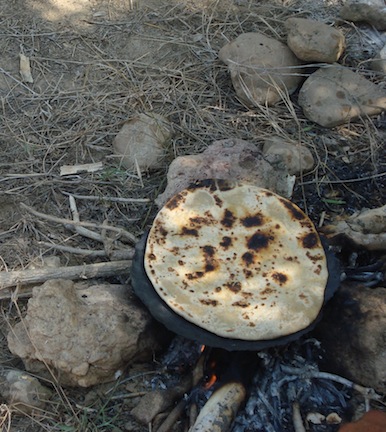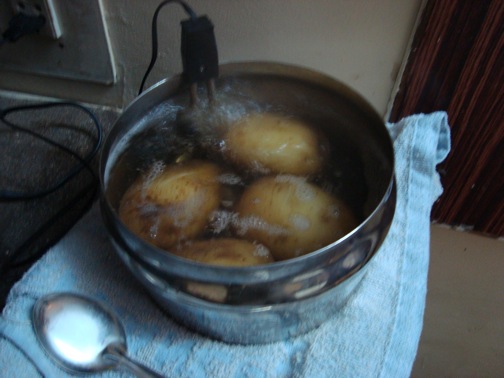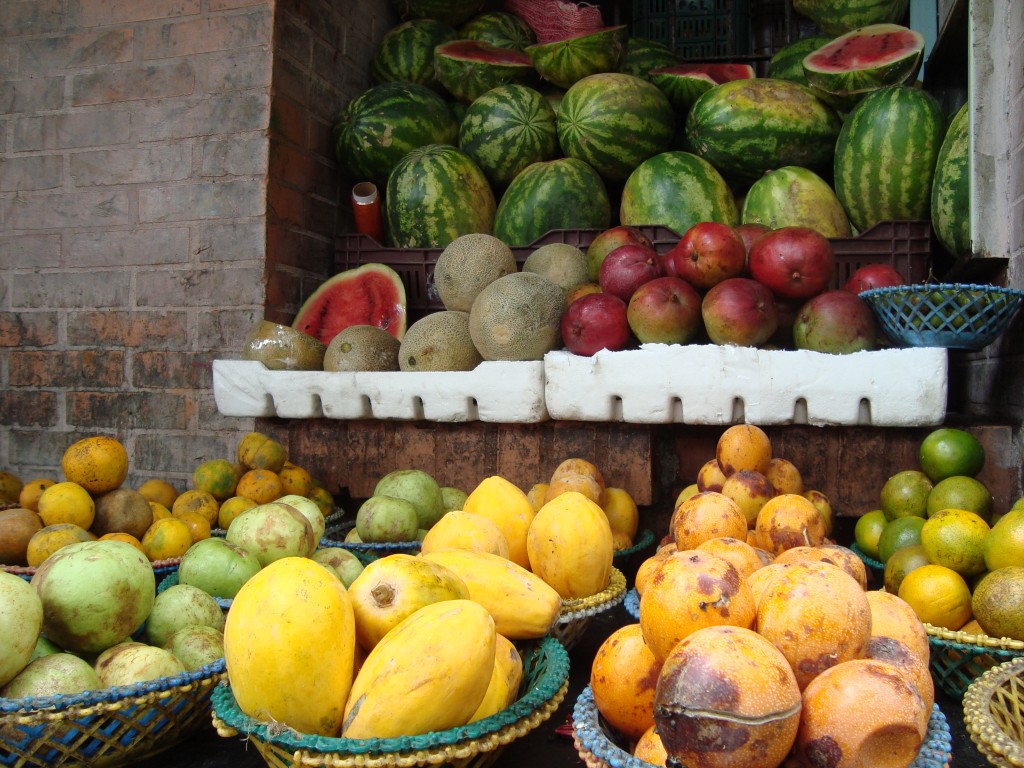 In my previous post on an overview of Jewish vegetarianism, I noted that there were 5 main reasons given by most vegetarians for why they stop eating meat. In Judaism, too, there are 5 main reasons for becoming vegetarian. Similarly, there are 5 main arguments Jewish religious critics of vegetarianism give. I have encountered these common criticisms many times during my travels, in Jewish communities all over the world. Even if you want to continue to eat meat, you should be aware of the issues posed by your actions. The existentialist in me is fond of maintaining awareness when making decisions!
In my previous post on an overview of Jewish vegetarianism, I noted that there were 5 main reasons given by most vegetarians for why they stop eating meat. In Judaism, too, there are 5 main reasons for becoming vegetarian. Similarly, there are 5 main arguments Jewish religious critics of vegetarianism give. I have encountered these common criticisms many times during my travels, in Jewish communities all over the world. Even if you want to continue to eat meat, you should be aware of the issues posed by your actions. The existentialist in me is fond of maintaining awareness when making decisions!
1. There is no animal cruelty because kosher laws dictate animals must be treated well during their lifetimes. Also, animals die instantly when slaughtered kosher, before they can even feel pain, so it’s not animal cruelty to eat kosher meat.
This is a great ideal to which to aspire, but in practice it is rarely observed with the amount of reverence it deserves. Most animals in the US today are factory farmed. I don’t want to go into the details of what that means, but basically the animals are restrained, kept in overcrowded conditions, and fed unnatural foods. By no stretch of the imagination can this be considered “good treatment” so as to satisfy the Biblical mandate of tsa’ar ba’alei chayim and I have never heard anyone claim it does. Yet, the meat that gets to your kosher table comes from factory farms just like all the burgers in McDonald’s do. So how is it possibly considered kosher? Producers of this meat purchase the animals as they enter the slaughterhouse. Because the livestock were previously owned by non-Jews, the Jews aren’t responsible for their treatment. Although this loophole does follow the letter of the law, it blatantly violates the spirit of the law. Several rabbis, including Rabbi Natan Slifkin (the “Zoo Rabbi”) have declared that even if this loophole is used, this meat still isn’t really kosher. Furthermore, it is not certain that animals slaughtered kosher feel no pain, as time from cutting to death depends on a variety of factors, including the exact sharpness of the knife, the skill of the shochet, the species, and the manner in which the animal is restrained. Sometimes animals may retain consciousness for 30 seconds before they finally die.
2. G-d gave us animals and told us we can eat them, so it’s ok.
G-d initially gave us the animals so we could care for them, not eat them. In the Garden of Eden, Adam was charged with naming the animals, giving him responsibility for them even on a spiritual level. He definitely wasn’t eating them – G-d told him to eat from “every herb yielding seed” and every “fruit of a tree yielding seed.” This was the ideal G-d wanted for man. Meat-eating was only permitted after the Flood. According to Rabbi Samuel H. Dresner, this was an accession to human weakness – if G-d hadn’t let humans eat animals, they would have sunk again to pre-Flood levels of degradation and eventually ended up cannibalizing each other. So, yes, it’s permitted, but it’s not permitted for the nicest reason and I don’t know if I’d be too proud about “needing” to eat meat…
3. Kosher meat is healthier, so you don’t have to worry eating too much might make you sick.
In some respects, kosher meat is healthier, but in some respects it’s not. Because certain parts of the animal aren’t used and all blood is removed, less disease is spread. On the other hand, by salting the meat a lot more, the higher sodium content can be harmful to people with heart problems. In all other respects, kosher meat is processed in the same way as non-kosher meat. Most processing is even done in the same factories. That means that any dangers to health regular, non-kosher meat has also apply to your kosher meat. Finally, most health hazards come from eating too much meat, not from the meat itself. In the long run, over-consumption of meat has been linked to arteriosclerosis, atherosclerosis, several kinds of cancer, osteoporosis, and arthritis, to name a few. Eating kosher won’t prevent these diseases or even reduce their risk – only reducing your meat intake will do that.
4. We have to eat meat to raise the “sparks” of the animals’ souls up to a higher level by using their energy to do mitzvot.
This comes from the kabbalistic concept that during the creation of the universe, “sparks” of holiness fell down to the lower levels and, as Jews, it’s our job to go out and find them and raise them up. This is considered to be one of our main jobs while we’re in exile. Alternately, it is related to the kabbalistic concept that a human soul may have been reincarnated into an animal to atone for a specific sin – if the meat is then eaten and a certain mitzvah performed, the human soul is freed from its sin to be reincarnated as a human again. Rabbi Yonassan Gershom points out that this collection of “sparks” is cumulative and as we near the days of moshiach, there are fewer sparks to collect. Each person has their allotted sparks and it does happen that sometimes a person has just managed to elevate all the “meat sparks” they’re supposed to. Rabbi Gershom also notes that, unlike in the past when people had individual relationships with their animals and the shochet (slaughterer) made a new blessing over each animal, in today’s factory farms and slaughterhouses, the proper kavanah (religious intention) is no longer present and this results in there being no sparks in the meat. “The Breslover Rebbe stated that only a person who has reached a high spiritual level can be elevated by eating animal foods, and the opposite is also true: a person who lacks this high spiritual level may be further debased by eating animal foods.” Similarly, the Gemara states that only a true Torah scholar may eat meat. In spite of the sparks that need to be elevated, Rabbi Moshe Cordovero, a major 16th century Kabbalist, encouraged people to eat as little meat as possible
5. It is a “mitzvah” to eat meat and drink wine on Shabbat and Yom Tov.
Rabbi Moshe Goldman notes that the source for this “mitzvah” comes from the prophet Isaiah, who tells us to “call the Shabbat a day of delight,” just as a yom tov, which is a “good day,” a holiday. This means different things to different people. At one point in Jewish history, having a big fish on Shabbat and Yom Tov was considered a “delight.” Today, meat is considered to be more of a “delight” than fish, so it’s viewed as part of the mitzvah to enjoy and be joyous on Shabbat and Yom Tov. Even the Lubavitcher Rebbe has said that if eating meat doesn’t give you any pleasure, you shouldn’t eat it, even on Shabbat or Yom Tov.
Bearing all that in mind, I’m a pretty “live-and-let-live” kind of person, particularly when it comes to vegetarianism. It doesn’t bother me when other people eat meat around me (although I’m not fond of handling it, since I can’t help thinking of it as the internal organ of a dead animal). I don’t run around trying to convince other people to become vegetarian. In fact, Rabbi Ben isn’t vegetarian, although he isn’t a big fan of meat and is often vegetarian because he travels so much. So I don’t recommend you take these arguments and run off to convince all your friends to give up eating meat, but rather, I hope you will use this information to make informed decisions and to raise interesting discussions with your friends and family.
Why would a Jewish and kosher world traveler become vegetarian?
Why do Jews become vegetarians?
What does the Bible say about vegetarianism?
Being a Jewish vegetarian doesn’t have to be boring! (Part 1)
Being a Jewish vegetarian doesn’t have to be boring! (Part 2)
Read More















